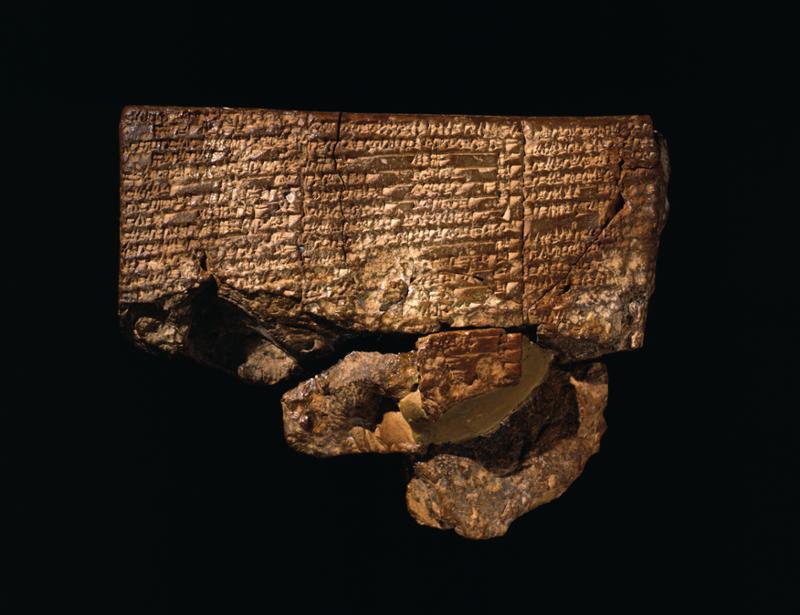Peter Bekins sent me the following by e-mail, and I thought I should share it with readers here, with his permission:
_______
In light of the recent Facebook discussion on your wall re the flood and the Grand Canyon in which one gentleman was adamant that the Bible predates the Babylonian myths and since you seem to take an interest in these sorts of things in general, here is one for your file. I [recently had someone argue] that the Genesis flood was historical based on evidence from an obscure Babylonian flood tablet referenced as CBM 13532, overlooked, of course, by academics, that a) dated from 2200 BCE, hence it pre-dated Gilgamesh and Atrahasis, and b) matched the Genesis account rather than the “fanciful” Babylonian myths. Consequently, the Noah flood story was the original historical account which was subsequently modified by the Babylonians who added all the mythical elements rather than an Israelite adaptation of a Babylonian myth.
A Google search revealed that the main thrust of the argument comes from the article “Genesis, Gilgamesh, and an Early Flood Tablet” by John D. Morris, PhD who seems to have taken the idea from a pamphlet written by a UK creationist named Dr. Bill Cooper, but which is unavailable on-line.
Here is how they represent the text of this “earliest flood tablet”:
The springs of the deep will I open. A flood will I send which will affect all of mankind at once. But seek thou deliverance before the flood breaks forth, for over all living beings, however many there are, will I bring annihilation, destruction, ruin. Take wood and pitch and build a large ship!….cubits be its complete height…. a houseboat shall it be, containing those who preserve their life….with a strong roofing cover it…. the ship which thou makest, take into it….the animals of the field, the birds of the air and the reptiles, two of each, instead of (their whole number)….and the family of the….
The other hit on a CBM 13532 was the 1910 publication of the tablet by Hermann Hilprecht. Dr. Cooper (and subsequently Mr. Morris, PhD) seems to have relied on a popularization of this publication by Fritz Hommel in a 1910 article in the Expository Times.
Here is Hilprecht’s (1910: 49) original rendering:
… “thee,
… “[the confines of heaven and earth] I will loosen,
… “[A deluge I will make] and it shall sweep away all men together;
… “[but thou see]k life before the deluge cometh forth;
… “[For over all living beings,] as many as there are, I will bring overthrow, destruction, annihilation.
… … “Build a great ship and
… … “total height shall be its structure.
… … “it shall be a house-boat carrying what has been saved of life.
… … “with a strong deck cover (it).
… “[The ship] which thou shalt make,
… “[into it br]ing the beasts of the field, the birds of heaven,
… “[and the creeping things, two of everything] instead of a number,
… … “and the family ….
…. “and” … …
You will note, of course, that almost all of the text that “matches Genesis” was actually supplied by Hilprecht to fill in breaks in the tablet based on his theory that, wait for it, this tablet matches Genesis. Cooper or Morris, PhD conveniently deleted all the brackets while leaving the ellipses. Further, the only phrase on the actual tablet that has any possible link with Genesis would be the Akkadian ku-um mi-ni, which Hilprecht translated as “instead of a number” and he related mi-ni to Hebrew מין ‘kind’, which is characteristic of the Priestly creation and flood accounts.
A few further notes. First, the articles from 1910 consistently date the tablet to about 2100 BCE. I do not know why Cooper and Morris push the date back to 2200 BCE. Second, this date was contested immediately (see here), and the tablet fits better in the later context of Nippur during the Kassite period, c. 1400 BCE. Regardless, only a few years later Poebel published the Sumerian flood tablet from Nippur, which renders the whole argument moot since it attests to an earlier “mythological” flood account. anyway
Second, Morris, PhD and/or Cooper appeal to a rhetoric that this tablet has been overlooked by academics. Indeed, a search on CBM 13532 brings up few hits post-1910. But this is because CBM is the wrong abbreviation. The tablet is in the Penn collection and catalogued as CBS 13532. Hilprecht does refer to the tablet as CBM, but it seems the numbering system changed. Regardless, CBS 13532 has not been overlooked by scholars and it occurs in the standard work on Atrahasis by Lambert and Millard. (You will note that they read ku-um mi-ni in line 12 as a single word ku-um-mi-ir [taking the sign ni as a mistake for ir] “heap up” but this short broken line is difficult to read.)
Third, Morris, PhD, and/or Cooper appeal to an argument that “Professor Hilprecht himself was hardly a defender of Scripture, yet he was a recognized expert in ancient languages.” As this article notes, however, Hilprecht did have motives to read the text in a way that legitimizes the traditional understanding of the Bible—he was sponsored by the Babylonian Exploration Fund, which “encouraged the generosity of moneyed citizens” for whom “the hope of scientifically establishing the truth of the Old Testament was comfortingly high-minded in an age troubled by Darwin yet unwilling to give up religious verities.”













